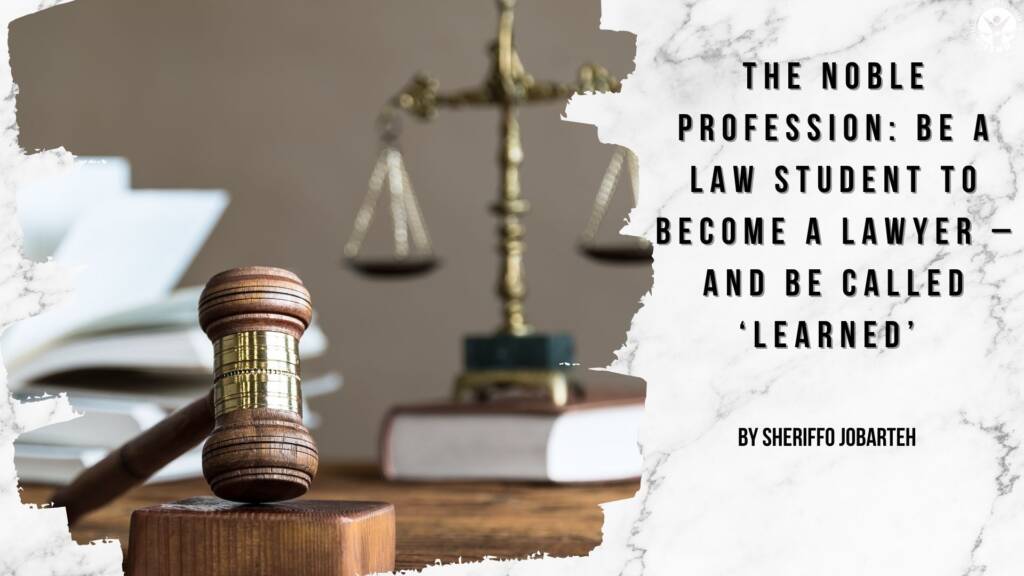‘LEARNED’


The noble profession: Be a law student to become a lawyer – and be called ‘LEARNED’
‘LEARNED’ is not given, it is EARNED. Lawyers earn this. They do. Didn’t they? Does this mean others are not? Well, ours is the noblest profession. Noble men and women of the law. ‘Learned friends’ in law. SALUTATIONS.
But let me quickly state, that to be learned is to possess and embody skills and unique qualities that every lawyer ought to have through legal training. It is not an empty address to boast about, it must be grounded in one’s knowledge of law and be able to translate that into action to benefit society.
If you think of becoming someone in future to have ‘LEARNED’ called out on you after you pass anywhere or wherever you appear – enroll in International Open University, The Gambia’s Law Faculty and be a law student to become a lawyer to enable you to shoulder such in future. In Letters To A Law Student, Junius Jessel Burke speaks of the ‘legal mind’ in these terms:
If you desire to become a lawyer you have a career of untiring application and industry to face. You must possess or succeed in acquiring what is called the “legal mind,” or the faculty of being able to trace legal distinctions. Until you possess this qualification it is almost self-evident you cannot be considered a lawyer. Now this “legal mind” is generally only acquired after undergoing a thorough legal training.
Be a law student NOW. Being one will have you acquire the status of having a ‘legal mind’ which is closely synonymous with ‘LEARNED’. Lawyers are called learned because they are taken to know something about everything in life. How? Because, every aspect of human life is regulated by law and as such, through law studies, one will encounter and have little knowledge about the whole gamut of laws existing in and out of one’s domain about all aspects of life. This is even more apparent when one is born and study law in a ‘common law’ jurisdiction. This is a jurisdiction or country that Britain has colonized and its legal system prevails there through the application of common law and principles of equity.
Through the study of law and subsequent work as a lawyer, one will deal with all issues of life in and out of Court. A lawyer defends and prosecutes matters that border on all aspects of life. From the economy, political, customary matters, artistic, marital, agricultural, engineering, technology, space, the sea and a host of general and specific issues of life. All these areas are regulated by law and if disputes arise, they are subjected to scrutiny through the Courts and that is where the trade of lawyers is always on display. The critical and vital role of lawyers in the socio-economic development of a country makes them a cut above the others and stand out from the CROWD OF PROFESSIONS. This does not mean other professions are not important. Without others, lawyers will not be called ‘LEARNED’, so to speak. This is because they stand and defend their interest.
To stress – knowing and dealing with all professions, laws regulating the same and all aspects of life through dispute settlement and courts – makes the lawyer ‘learned’. Ogunwumiji JCA said this of ‘learned’ in Njaba L.G.C v. Chigozie (2010) 16 NWLR (Pt. 1218_ 166 at 193 paras:
“… A lawyer is always learning, that is why we are called learned.”
Aren’t other professions always learning? One may not agree with Justice Ogun here but the kind of learning is perhaps different. Because, ordinarily everyone learns and keeps on doing. But the ‘learning’ here is beyond the word. It seems to be learning all that Fafa E Mbai, former AG of The Gambia said quoting Baroness Helena Kennedy KC from the book ‘JUST LAW’:
“The Law is the bedrock of a nation; it tells us who we are, what we value … Almost nothing has more impact on our lives. The Law is entangled with everyday existence, regulating our social relations and business dealings, controlling conduct which could threaten our safety and security, establishing the rules by which we live. It is the baseline.”
Learning the ideals and principles that serve as the baseline of the society, that which has more impact on lives than anything or idea and living through the application of same as a trade cannot be described in any way than being ‘learned’. Other professions are just educated. But lawyers are learned. On the role of lawyers which cut across all professions, the former AG further said:
We are the priests and priestesses, the ministers of the law. When a man (or a woman) is ill, he needs a doctor. The doctor diagnoses, prescribes, operates and does whatever else that is needed to save life. The patient lives and he is happy to have the gift of life and good health.
The same man (or woman) suddenly finds himself on the verge of losing his house or is it his job? He may instead find he has been badly cheated in a business transaction or that he is a victim of domestic violence, or negligence or even that he is locked up on some trifling accusation. He needs a lawyer and he needs the court. Where he cannot brief a lawyer, who will sort through the maze of his problems, he begins to see that his life has no value or meaning. He finds out soon too that his tablets, injections and surgery can only translate to good health and life when there is value added.
As ministers of the law, we are equipped to add that value, to give meaning to the lives of people through legal advocacy and the application of the law. The right to life is as much as the right to access to the law. For the role we play in sorting out the lives of the people and making these lives meaningful; for constantly staving off human tendencies to resort to a Hobbesian state of nature; for often finding that the saving of situations that are important to the individual would rest in the actions we take.
This is the role that makes lawyers stand out. The issues that lawyers deal with are a lot. They are capable of preparing briefs on all aspects of life where disputes exist. When an economist, agriculturist, engineer, tech giant or any expert in any field is being examined or crossed-examined by a lawyer – then the LEARNED nature surfaces and becomes clearer to all. Having an idea from the text of the law that regulates such an expert’s sphere – the lawyer will confront the expert after acquiring some basic knowledge on the area studied for a lifetime by the expert. This isn’t for the weak to do. It takes one who has some knowledge or idea on every aspect of life. We are Ministers of the law – equipped with all the necessary skills to deal with all aspects of life. Every problem looks for our CHAMBERS. For our intervention. Our knowledge of the law and our distinguished advocacy skills battle out contested issues for determination by an umpire who is also learned. The continuous learning of the principles, ideas, concepts and laws bordering on everything in life enables lawyers to have diverse knowledge on all things that attract human endeavour.
It has been contested that ‘LEARNED’ was not historically attributed to only lawyers but to the medical profession and so on as well. But between law and others, which one is the oldest profession? Professor George O.S Amadi, in his inaugural lecture at the University of Nigeria, answered this question eloquently:
Do not ask me which of the two disciplines (law and politics) is the older of the fraternal twins. Of course, law is older. Indeed, law is the second oldest profession after Divinity, i.e. priesthood. God is the First and Eternal Priest. His creation of the world is based on law. And everything created, whether living, exists under (natural) legal principles. Politics emerged when Lucifer rebelled against the rule of Divine law. His rebellion was the progenitor of negative politics on earth.
Even though the older nature might not be a sole determinant, it says a lot about where learned lies most – where it belongs. Then, from the above, studying that which came after divinity tells it all. The World is created based on law. Because a command from God is law and failure to abide by it attracts natural consequences. So, learning such makes one LEARNED. Because the law from God addresses everything. But the law also made by men addresses almost everything – anything left unaddressed will subsequently be addressed through amendment, modification and so on – which in a sense reveals human imperfection.
Having brought to the fore some reasons why lawyers are called learned – it is no mean to say other professions are not important. It is to expose readers to the few reasons why we are called so. It is also not reason enough for lawyers to think they are above others. They need to work with others. Lawyers are part of society, and they work for people – as such, humility, hard work, ethics and adherence to a good code of practice are the hallmarks of a good lawyer. A lawyer is a servant of the people – a client’s agent – and an officer of the law and court.
Lastly, ‘LEARNED’ can be truly felt when a lawyer’s work impacts positively the rule of law, democracy, good governance, human rights and ideals that undergird and keep society on its toes. These in turn will enhance sustainable socio-economic development. I end with this profound statement from, Fafa E Mbai on the critical role of law and lawyers:
Law is an indispensable machinery of all governments whether democratic, dictatorial, or monarchical. All systems of government do pay homage to some form of legal norms. Which other profession is almost always given a seat in the government of almost all nations? Let us imagine for a moment, a world without Lawyers, and therefore without law. I am right, am I not, that if Lawyers did not exist it will be necessary to invent them. We must therefore by our collective and individual example as members of this noble profession continue to be the safety valve of democracy, human rights and the rule of law. All the calumny and vituperative tirades are unjust to us, grossly unjust indeed. It is our responsibility to deal with the peoples’ misfortunes, problems and difficulties within the complexities of the society. In spite of technological developments, no society has been able to avoid these problems because they arise from the very nature of the society itself and whether we like it or not such problems will continue to be with us and must be solved.
Yes, it would have been naturally necessary to invent law and lawyers if they didn’t exist. Imagine a world without law and lawyers? I always scoffed at Shakespeare’s instruction; ‘The first thing we do, let kill all the lawyers’ (Henry VI, Part 2, act IV, Scene 2) – because he will need them to defend him after killing them from those he instructed.
Skills and qualities of a lawyer
Tembeka Ncgukaitobi, South African Lawyer and Author speaking on craft and advocacy skills said, ‘speaking and writing come from reading’. This is to say, as a lawyer, you must read and read without season. Read widely, read outside law. Read economy, politics, philosophy, psychology and other areas. This will arm you as a lawyer with enough knowledge in other areas. Reading makes you a good lawyer. Read good books. A lawyer should be creative, emotionally strong, fair in judgement, firm, patient, passionate, compassionate and have to persevere. To add, a lawyer should be responsive have arguments and have critical thinking skills. All these are acquired through long legal training which earns a lawyer the status of ‘LEARNED’.
I love the Law and the law loves me. I keep loving it. You should love it. It is a lovely thing.
Sheriffo Jobarteh





